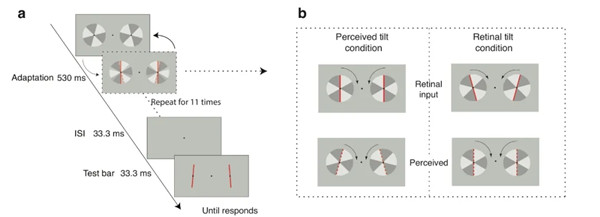Home> News
Chinese research team reveals importance of feedback signals for cortical neurons, to recalibrate their sensitivity
Updated: 2020-08-12

A diagram shows an experimental schematic of the Flash-Grab Effect, as an adaptive stimulus causing a shift towards an adaptive aftereffect. [Photo/WeChat account of BSC]
A research paper entitled Adaptation to feedback representation of illusory orientation produced from flash grab effect -- written by a Chinese research team from the State Key Laboratory of Brain and Cognitive Science of Institute of Biophysics under the Chinese Academy of Sciences (CAS) -- was published in the prestigious peer-review scientific journal Nature Communications on Aug 6. It highlighted the important contribution of feedback signals for cortical neurons, to recalibrate their sensitivity.
According to news on the public WeChat account of the Biophysical Society of China (BSC), the research team led by He Sheng investigated the relative contributions to cortical adaptation from feedforward and feedback signals, taking advantage of a visual illusion, the Flash-Grab Effect, to disassociate the feedforward and feedback representation of an adaptor.
The team's research results were found to reveal that orientation adaptation is exclusively dependent on the perceived, rather than the retinal orientation of the adaptor. Combined fMRI and EEG measurements demonstrate that the perceived orientation of the Flash-Grab Effect is indeed supported by feedback signals in the cortex.
Adaptation is a ubiquitous property of sensory systems. It is typically considered that neurons adapt to dominant energy in the ambient environment to function optimally. However, perceptual representation of the stimulus, often modulated by feedback signals, sometimes does not correspond to the input state of the stimulus, which tends to be more linked with feedforward signals.
